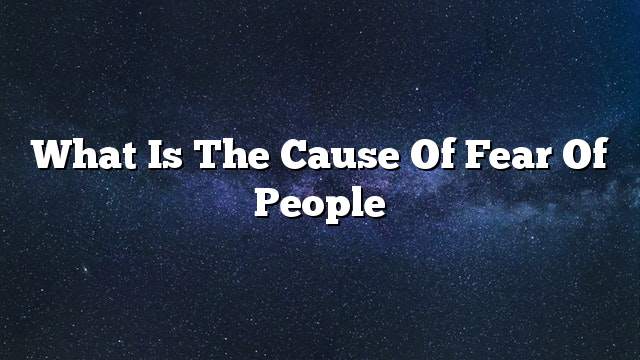Fear of people
Human happiness and comfort stem from its ability to adapt to the surrounding environment and to satisfy its needs to interact positively in its relationships. People who suffer from fear of people will have problems of adaptation, resulting in their unhappiness, normal daily life, and performance. Their tasks as they should.
Scientific terms of a sense of fear of people
Causes of social phobia
Doctors have worked hard to explain these feelings, and they conclude that there are a number of causes of social phobia of people:
- Genetic causes: There is greater genetic readiness in people whose parents suffer from this condition.
- Causes of the brain: Where there is a defect in the response centers towards fear in the brain.
- Environmental causes: They appear as a result of what the person learns from the environment, and the observation of other people.
Causes of environmental social phobia
There are a number of environmental causes that are exposed to the injured in childhood, and are among the causes of social imbalance in general, and social shame in particular, including:
- Feelings of insecurity: Emotional security is one of the basic needs of the child, since he must feel the love, affection and appreciation of those around him. If this need is not met, the child will feel insecure and therefore insecure.
- Fear of school: Children are usually afraid of the first day of school because they fear the unknown or other children do not accept them. This tendency leads to social problems, such as when the child refuses to participate in class, participate in activities, or interact with teachers.
- Modeling: Where children learn to behave by tradition. If a parent or loved one suffers from a lack of self-confidence, withdrawal or excessive shyness, the child will learn and imitate his behavior.
Symptoms of social phobia
Physical symptoms
Physical symptoms appear on people with social phobia when exposed to social attitudes, including:
- blushing.
- Excessive sweating.
- Flicker.
- Fast heartbeat.
- Nausea.
- Difficult to speak.
- Feeling dizzy.
Psychological symptoms
There are psychological symptoms felt by the injured when exposed to social attitudes, such as:
Symptoms of avoidance or social withdrawal
Symptoms of avoidance or social withdrawal:
- Avoid asking questions.
- Avoid attending job interviews.
- Avoid shopping.
- Avoid eating in public areas.
Complications of social phobia
If social phobia or fear of people in a person can, it may lead to the following problems:
- Low self esteem.
- Excessive sensitivity to negative cash exposure.
- Weakness in social skills.
- Addiction to drugs and alcohol.
- Attempted suicide.
- Negative talk with self.
- Isolation, and the difficulty of forming social relationships
- Low academic and career achievement.
the cure
There are several ways in which a person suffering from social phobia can get rid of this condition:
Self-help to get rid of the situation
There are some things a person can do home to get rid of social phobia, such as:
Modified lifestyle
Where it is possible to improve the way of life by:
- Eat a healthy balanced diet.
- Stay away from alcohol or drugs.
- Exercise regularly.
- Communicate with people who feel comfortable.
- Get enough sleep.
- Join support groups; either direct or online support groups.
Gradual practice of treatment activation
Treatment can be made more effective by:
- Eat with a close person in a public place.
- Give praise to others.
- Communicate with a friend; to prepare for projects or activities together.
- Start greeting others and communicate visually with them.
- Ask for help from shopkeepers to help find the desired demand.
- Communicate with others, and ask about their situation and their lives.
Preparation for social attitudes
This is done by:
- Preparing for conversations, such as reading a short story or a joke;
- Practice relaxation exercises.
- Do not fear situations that may cause embarrassment, look at them as they will pass, and that everything will be fine.
- Focus on the person’s positive traits.
- Set realistic goals.
